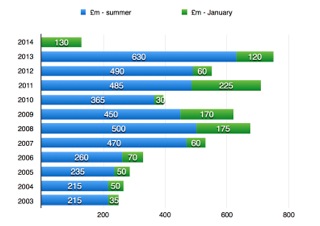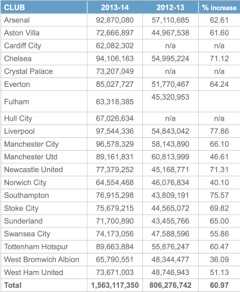“Anyone who lives within their means suffers a lack of imagination.” Oscar Wilde
A lack of imagination is not football’s affliction. This game gives flame to our childish dreams. The nine-year-old Aberdeen fan Boyd Gibson, who submitted a transfer wish list to his club requesting they purchase such as Cristiano Ronaldo, Zlatan Ibrahimovich, Gareth Bale and Lionel Messi, was only echoing the boyish fantasies that consume every one of us at times. Particularly during football’s summer harvest.
Most clubs are like the Dons, for whom the thought of signing a player of even Kaka’s diminished quality (he was also on little Boyd’s list) is so laughable as to warrant making a joke of it on Twitter (as Aberdeen did). This summer, though, some lucky clubs will indeed be drawing up target lists as bounteous as Boyd’s. Most of those lucky ones will be English.
Deloitte’s most recent Football Money League calculated that eight of the top 30 clubs in Europe by 2012-13 revenue were from the Premier League. The data, though, was already a year out of date as last season the best-in-class value of the Premier League’s broadcasting receipts had transformed its clubs’ fortunes.
Premier League broadcast income
Source: Premier League.com
Depending on league performance, clubs received on average almost a 61% increase in their central broadcasting payments. Some, such as West Bromwich Albion, Norwich City and Manchester United, saw a lower rise due to disappointing football results. Others, such as Liverpool, Everton and Stoke City, saw better financial returns, reflecting their improving football fortunes.
This time last year clubs already knew these incomes were coming on stream. But they did not yield to their inner Boyd Gibson. According to estimates by Deloitte, Premier League clubs spent a cumulative £630 million on transfers last summer, a mere 26% increase on the previous record, registered in 2008. Since that record was set, however, Premier League clubs’ cumulative central broadcasting income has more than doubled from £2.7 billion to £5.5 billion over three years. And, so far at least, transfer spending has not kept pace.
The chart below illustrates how much spare capacity there is in English clubs’ transfer budgets.
Premier League estimated transfer spending

Source: Deloitte
Intriguingly, in a summer when Real Madrid almost matched their own world transfer record by purchasing Gareth Bale from Tottenham Hotspur, Premier League clubs showed relative restraint. Indeed, Spurs themselves spent about £100 million replacing the Welshman, meaning there was little difference between the 2008 record and 2013.
What drove this was a desire to fix their’ finances once and for all. For years clubs such as Everton have been spending around 5% of their entire annual revenues on interest alone, the burden of servicing a net debt of about £45 million. That figure gave Everton debt-to-revenue gearing of about 52.4% under previous broadcast cycles. Now, all other things being equal, Everton’s annual income for 2013-14 will have improved to about £120 million from £86.4 million the previous season. In that context a £4m-a-year interest burden is no longer so troubling a commitment.
There was also presumably a desire to keep powder dry ahead of the World Cup the following summer. Now that World Cup is upon us and, once the tournament’s final whistle is blown on July 13, we can logically expect a financial dam to burst, unleashing perhaps a billion pounds of transfer spending by Premier League clubs.
Such spending would not represent profligacy. In 2008, when the Premier League indulged itself like a nine-year-old in a sweet shop, three of the four Champions League semi-finalists were English. Ditto the following year. Since then, however, the Premier League’s European football fortunes have waned to the extent that they had only one representative in the last four in 2010-11, 2011-12 and 2013-14 and none at all during 2009-10 or 2012-13.
This rather suggests another molten flow of Premier League spending is overdue and, like a volcano where pressure has been building over time, the eruption could be spectacular. Against the collective backdrop, many clubs have their own individual incentives. Arsenal, traditionally the most frugal of the top European clubs, have dropped out of the top-eight-ranked sides in Europe. Were it not for the difficulties encountered by Manchester United this season Arsenal would not be seeded in next season’s Champions League group stages (provided they qualify). Alongside the fact they made England’s biggest single transfer investment last summer, in the £42.5 million shape of Mesut Özil, talk of £100 million of net transfer investment during the current window does not seem at all misplaced.
United too, with the arrival of Louis van Gaal as manager of a previously failing squad, must mark the new broom’s intent with landmark investments. Liverpool, qualified anew for the Champions League, will face new strain on their squad depth next season and can be expected to be as expansive in the transfer market as they were on the pitch last season. Chelsea need to reinforce in the most-expensive area of the pitch – the forward line.
Then there are the likes of Everton and Southampton, whose broadcasting incomes will in all probability be supplemented by the sales of young self-produced players or the departures of loanees, creating a need for spending of their own. Likewise the clubs in the next tier of the Premier League, whose periods of arid form or general flirtations with relegation last season will have served as a reminder of the fragility of the broadcasting bonanza available only to the 20 clubs who are the elite of English football. Many clubs will look on the English with envy, but they should recognise that it presents an opportunity too. English riches will have positive effects for the entire football ecosystem as the cash is distributed to other leagues, domestically in England and overseas.
After what was by common consent the most exciting season in Premier League (and possibly English football) history, this summer is similarly set to be an awesome firework display of financial ordnance. At least, so I would imagine.
Journalist and broadcaster Matt Scott wrote the Digger column for The Guardian newspaper for five years and is now a columnist for Insideworldfootball. Contact him at moc.l1746138716labto1746138716ofdlr1746138716owedi1746138716sni@t1746138716tocs.1746138716ttam1746138716.

